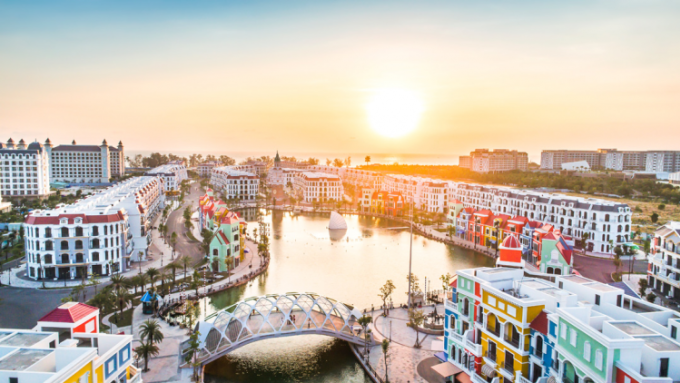Accepting tourists with 'vaccine passports' is considered an important step in the strategy of living alongside COVID-19 and will help revive the tourism and resort real estate industry.

Accepting tourists with 'vaccine passports' is considered an important step in the strategy of living alongside COVID-19 and will help revive the tourism and resort real estate industry.
Nguyen Quoc Anh, deputy general director of Batdongsan.com.vn, said that the real estate market was still facing many difficulties, so the first priority for the resort real estate market was the recovery of the tourism industry.
Experts say that if the application of 'vaccine passports' in the tourism industry is successful, it will be a driving force for many other economic sectors because foreign-invested enterprises have the need to bring a large number of experts to work in Viet Nam.
"The pilot 'vaccine passport' programme is a good policy at present," said Do Quy Duy, Hai Phat Real Estate Sales Director.
During the pandemic, the demand of the resort real estate segment had been very low, especially coastal tourism real estate. Meanwhile, this market held great attraction for foreign investors, he said.
Economic expert Dinh Trong Thinh said that 'vaccine passports' would provide great support for investment businesses. In order to take advantage of opportunities, businesses must prepare specific development strategies, and create tourism products meeting the needs of customers.
General Secretary of Khanh Hoa Real Estate Brokers Association Phan Viet Hoang said that the 'vaccine passport' was the best solution for all tourism real estate.
Marketing Director of Danh Khoi Group Ngo Van said large foreign investors expected to access the resort real estate market in Viet Nam. Their target was a real estate product line having high growth within 3-5 years.
Therefore, the segment of resort and coastal tourism real estate would be an attractive segment for all customers and investors after the pandemic was controlled, he said.
Viet Nam would be one of the best markets in Southeast Asia waiting for large foreign investors with big projects, Van said.
In the fourth quarter, social distancing measures would be reduced, which would also provide favourable conditions to attract foreign investors to Viet Nam, creating a great push to the real estate market, especially resort real estate.
For domestic investors, Van said, from the third quarter of 2021, disbursement in real estate projects had increased, especially since the Government strengthened vaccinations to control the pandemic.
This would be the moment that investors pour capital to own resort real estate products with legality, good location and many distinct advantages.
Following this trend, investment cash flow is gradually returning to resort real estate to catch great opportunities when the economy recovers. Customers will choose attractive investment products at reasonable prices, Vietnam News Agency reports.
The pandemic is changing travel demand. Many tourists, especially families, want to go to private and safe resorts to relax in nature. That is an opportunity for owning or investing in the wellness resort real estate product line.
However, Nguyen Van Dinh, vice chairman of the Viet Nam Real Estate Brokers Association, said the land fund for investors after the plan for Phu Quoc to be the first island city in Viet Nam is scarce, meaning lower investment opportunities. Because the land fund has been already allocated to businesses before this plan.
Therefore, the investors need to seize investment opportunities in the resort real estate market. This segment is still considered a "promising land" for investors because it is expected to have a strong rebound after the pandemic is controlled. — VNS





